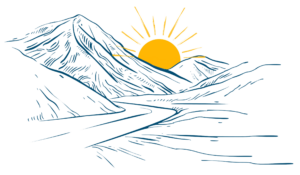“Duck Duck Goose” Turned Into a Prayer Circle
“On Saturday of the [Young Quakes] gathering, a group of us were playing duck duck goose in a nearby field during our free time in the afternoon. We had just started to play when another young Friend from the conference came running down the road in tears and proclaimed the news: President George W. Bush just announced that the United States had officially begun bombing Afghanistan.
At this point in my life, I had not thought very much about war and how I felt about it. Having been raised Quaker, I naturally assumed that violence was wrong, but I had never been directly challenged with the issue; had I not been in such a community on that particular day, my reaction would probably not have been very strong. Regardless of anyone’s personal reaction, our duck duck goose game turned immediately into a prayer circle. The community acted together as one without question or confusion. We sat outside in t-shirts in windy 40 degree (F) weather for an hour and a half, holding hands, some crying. When we finally moved the circle inside, we did so by marching arm and arm down the middle of the street. Some opted to get a black armband; I did, and I wore it for two years as a symbol of my pacifism and mourning for violence everywhere. The entire experience was very moving; the love, trust, and community response was like nothing I had ever imagined, and caused me to seriously think about my own pacifism and spirituality. I began attending meeting for worship more regularly, and have since attended all Young Quakes and FGC Gatherings possible.”
— Clark Redner, 2005 (18 years old)
Whispers of Faith: Young Friends share their experiences of Quakerism

Reader Reflection
When conflict arises in your community, how do you respond?
Over time, I have become effective at handling and resolving conflicts. I tend to be forgiving, always striving to find alternative solutions. However, it didn't start out that way. On my first day of school at a Friends school as a fifth grader, I got into a physical fight with a girl who later became a close friend. What intrigued me was how the teacher handled the situation. She sat me down and said, "In this place, we do not resolve our problems or frustrations through fighting. You will learn a better approach." She asked me some questions and then allowed me to return to the class activities. Looking back, I realize that my teacher skillfully listened, reduced my anxiety, and recognized the divine within me. All year, she repeated this with various students in the class. As an adult, I try to remember that when conflicts arise, it is essential to decrease anxiety among those present to foster better listening. Lastly, true forgiveness sometimes requires time, and I must remind myself to be patient with the process. -Trayce P., Tucson, AZ, USA
Every few months, a group of Friends gather for a 3-day working bee at a Quaker venue. This has been going on for years. One man had a habit of discussing things during epilogue rather than adopting a more worshipful (i.e. more silent) approach. After several years of this I finally confronted him. I said he was being disrespectful and secularising the nature of epilogue. He explained that, as he lived alone and rarely had the opportunity, he was seeking deeper spiritual conversations, more than silence. This made sense to me. He also showed me a photo of a woman wearing a dress. "What colour is the dress?" he asked. I said it was green. He said he saw it as being gold because he is colourblind. Something new registered in me. A deep acceptance of difference. Green/gold… who cares! It's still a dress! We both see a dress. Since then we have had a warmer relationship and have been able to offer more of what the other is seeking, more attention to having spiritual conversations and more worshipful epilogues. Everyone wins.
-Anonymous, Sydney, Australia
I tend to withdraw from conflict on the whole, but if the conflict is in regard to a justice issue, I will stand in the fray and speak my Truth. Sometimes this has resulted in the group being able to see things from a different perspective and other times it has ended in animosity. I use non-violent conflict resolution techniques and try to approach every situation with a listening heart, but sometimes the Truth is not heard. I make every effort to be open to new ideas myself, but in these fractious times, it is difficult to be open to people who believe in bigotry, oppression, and denial of basic human rights.
-Lisa E., Gulfport, FL, USA
Next Week’s Query
What is your process for centering in worship?

This Week’s Messages
Less Like a Utopia and More Like a Crucible
We Are an Imperfect Human Community
A Common Fear
Seeking the Truth of a Person
A More Painful Path
Conflict is an Opportunity for Growth








